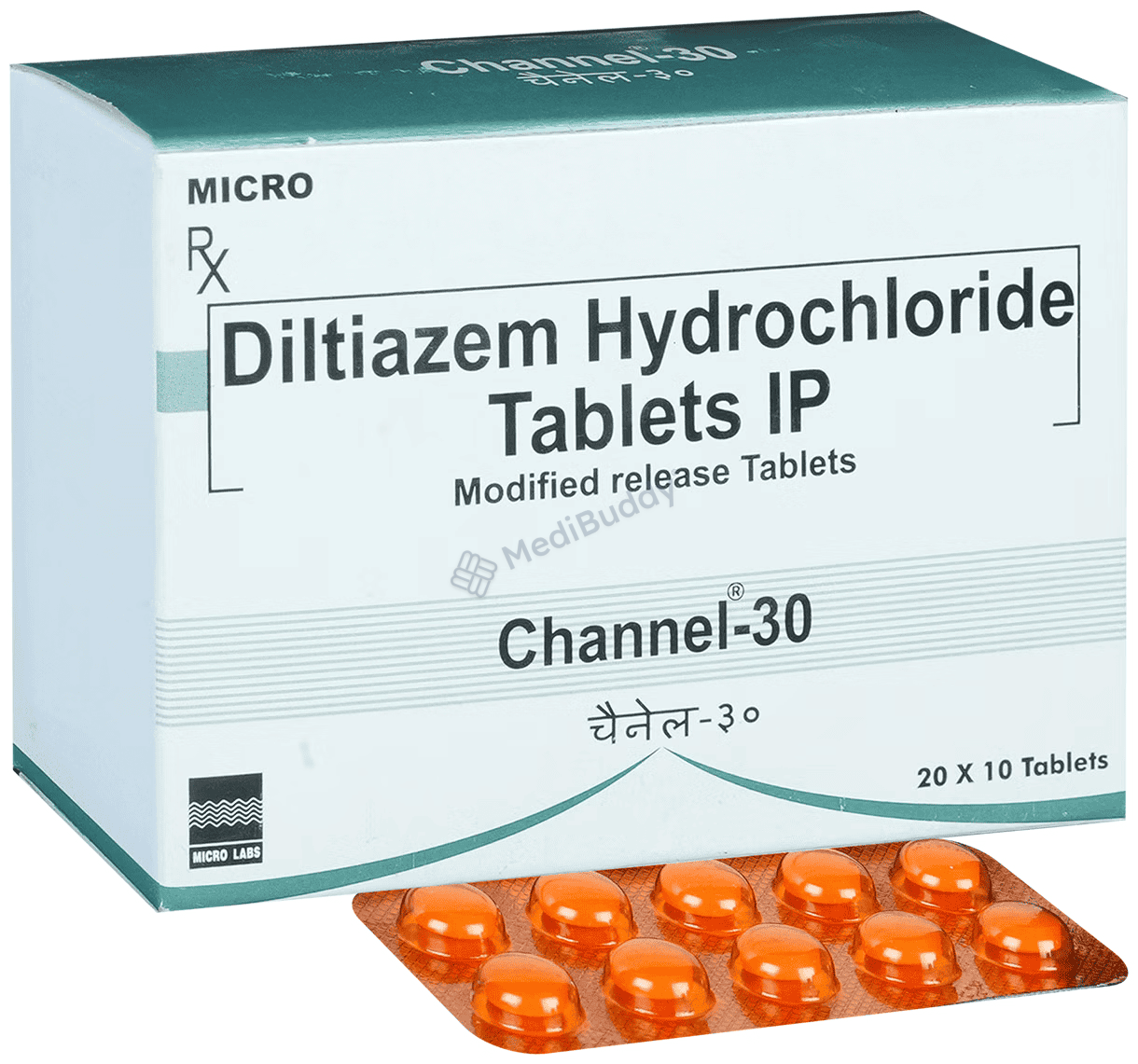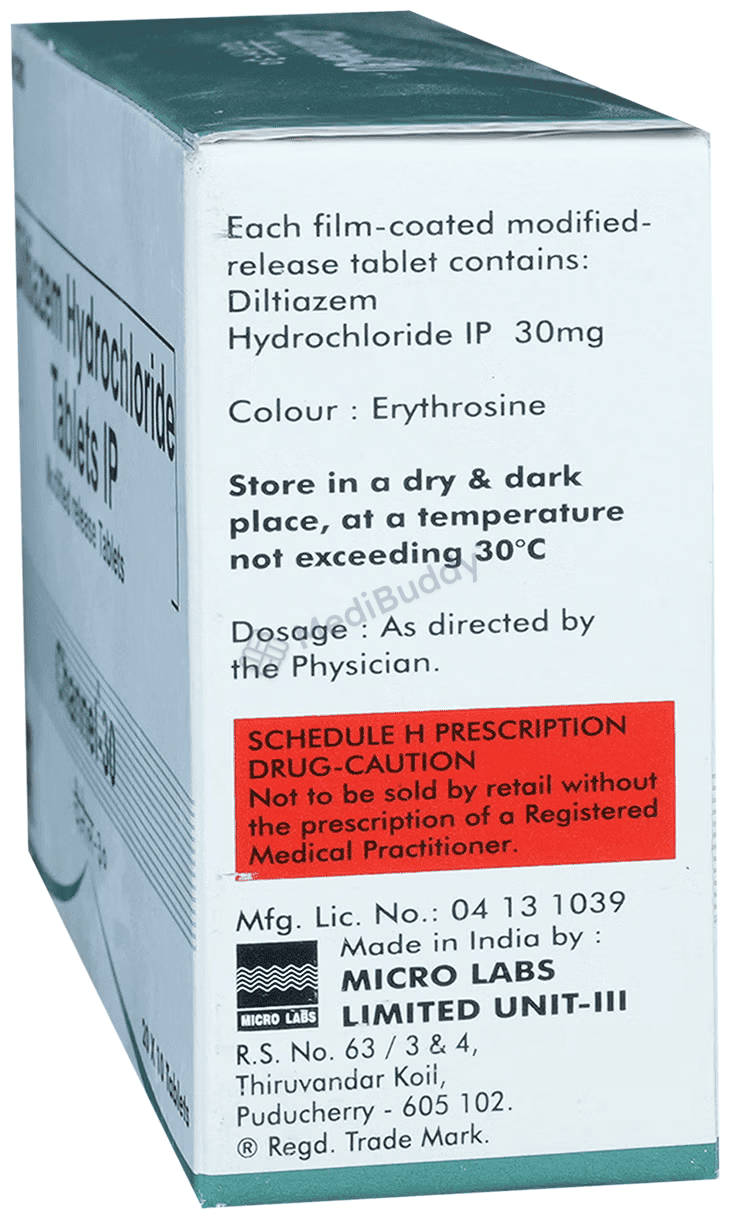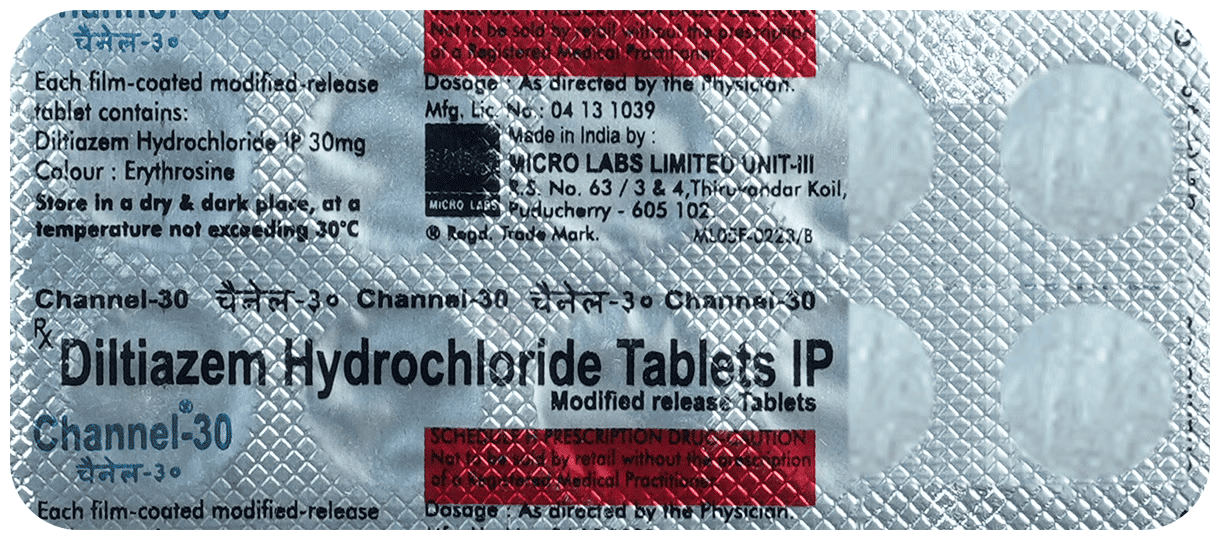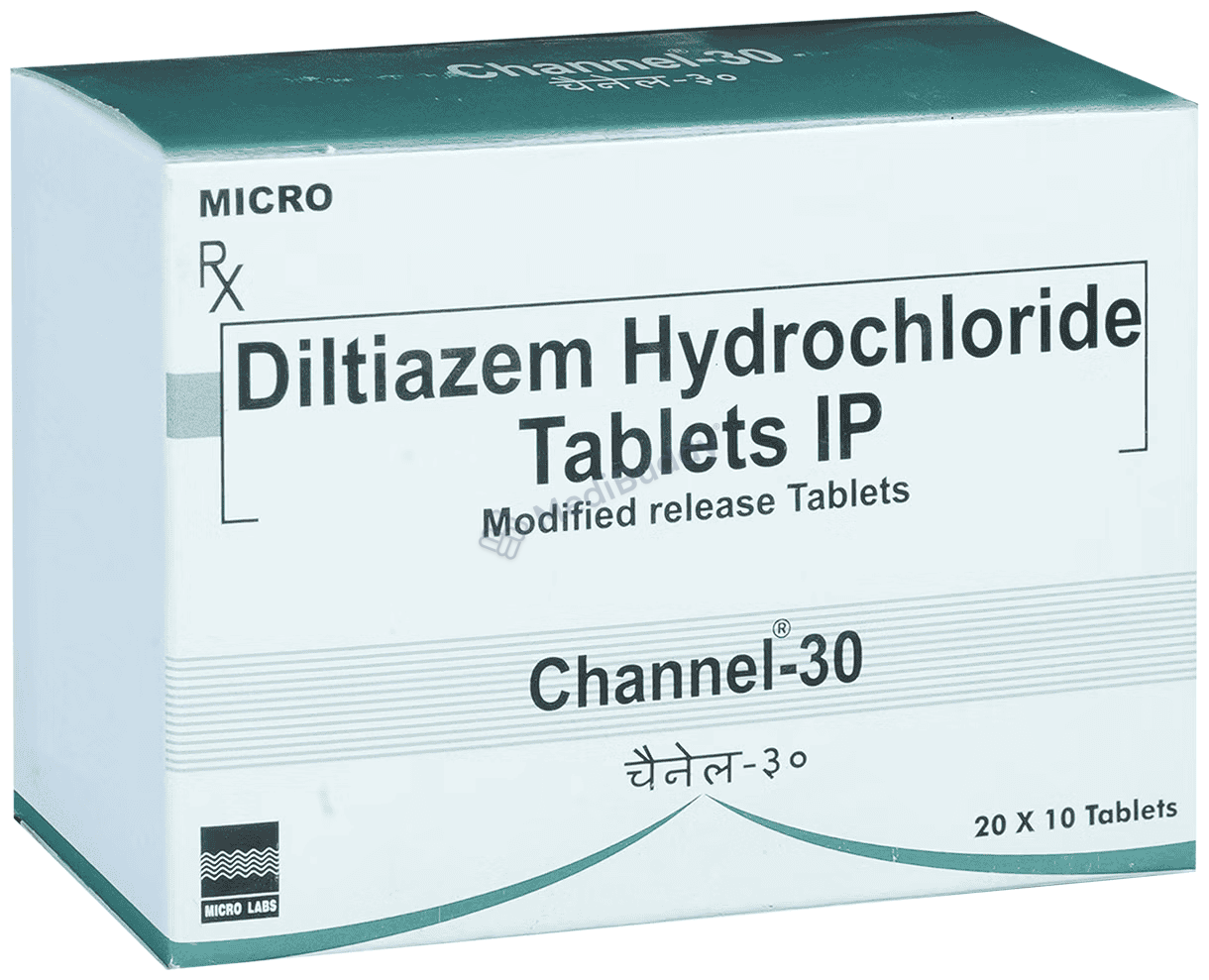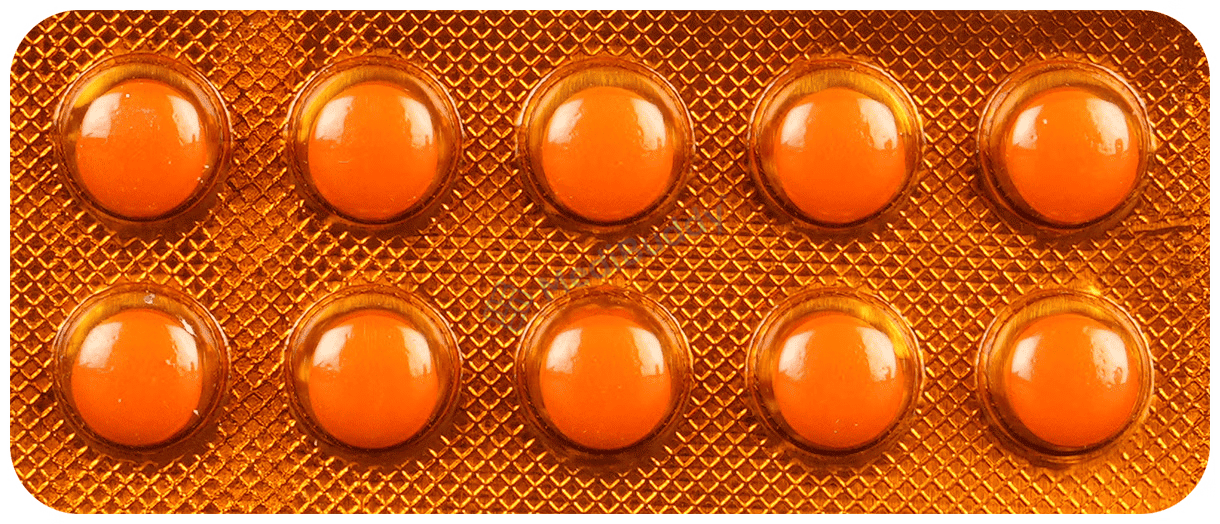Channel 30 Tablet MR
By Channel
Rx
10 Tablet MR in a Strip

Composition
Diltiazem(30mg)

Manufacturer - Micro Labs Ltd
27, RACE COURSE ROAD, BANGALORE-560 001, INDIA

Expires on or after
November, 2025
About Channel 30 Tablet MR
Channel 30 Tablet MR is a medication used to treat conditions like angina (heart-related chest pain), high blood pressure, and certain irregular heartbeats. It falls under the category of calcium channel blockers, which work by relaxing blood vessels to lower blood pressure, ultimately reducing the strain on the heart. Taking this tablet regularly at the same time each day, as per your doctor's advice, is recommended for its effectiveness.
It is essential to continue using Channel 30 Tablet MR even if you feel fine, as abruptly stopping the medication can worsen your condition. This drug is just one part of a treatment plan that should include a healthy diet, regular exercise, and weight management, all as guided by your doctor. Common mild side effects may include headache, constipation, dizziness, fatigue, nausea, flushing, or rash, which typically subside over time. If these side effects persist or if you experience significant drowsiness or dizziness, it is recommended to consult your doctor. It is important to avoid alcohol consumption while on this medication as it can exacerbate these side effects.
Before starting Channel 30 Tablet MR, inform your doctor about any liver or kidney issues you may have. Additionally, disclose if you suffer from very low blood pressure, heart failure, or if you have experienced a recent heart attack with fluid in your lungs. Expect your doctor to monitor your blood pressure while on this medication, possibly requiring regular blood tests. Pregnant or breastfeeding women should consult their doctor before using this medication due to potential risks.
Channel 30 Tablet 10's, another variant of this medication, is classified as a calcium channel blocker used to manage mild to moderate hypertension and chronic stable angina. It contains 'Diltiazem,' which operates by relaxing heart blood vessels to alleviate heightened blood pressure. This variant also aids in treating/preventing angina by preventing vessel constriction and dilating coronary arteries, subsequently improving blood flow to the heart.
While taking Channel 30 Tablet 10's, it is advisable to adhere to your doctor's prescribed regimen, which may include routine monitoring of blood pressure, electrolyte levels, and kidney function. Driving should be exercised cautiously due to potential dizziness caused by the medication. Pregnant or breastfeeding individuals should consult their doctors for alternative treatment options. This medication is not recommended for children, as its efficacy and safety profile have not been established. Notify your healthcare provider about your medical history and current medications before initiating treatment to prevent any adverse effects or interactions.
CHANNEL 30MG TABLET, containing Diltiazem, also a calcium channel blocker, is indicated for the treatment of angina and hypertension. Regular monitoring of kidney function, blood pressure, and blood sugar levels during treatment is crucial to mitigate potential adverse effects. Avoid consuming grapefruit or grapefruit juice while taking this medication, as it can lead to a severe decrease in blood pressure.
Prior to commencing CHANNEL 30MG TABLET, divulge any liver, kidney, or heart issues to your doctor, in addition to specific conditions such as diabetes, asthma, stomach ailments, or mental health disorders. This medication is contraindicated in pregnant women due to potential harm to the fetus and should be avoided in individuals with heart failure, severe low blood pressure, circulatory problems, or breastfeeding women.
Common side effects of CHANNEL 30MG TABLET include nausea, indigestion, constipation, dizziness, and ankle swelling. Contact your doctor if these side effects worsen for appropriate management.
Benefits
Channel 30 Tablet MR offers a range of benefits for various cardiovascular conditions. In the treatment of hypertension (high blood pressure), this medication works by relaxing blood vessels, allowing blood to flow more easily throughout the body. By lowering blood pressure, Channel 30 Tablet MR helps reduce the risk of serious health issues such as stroke, heart attack, or kidney problems in the future. It is important to take this medicine regularly as prescribed by your doctor to ensure its effectiveness, even if you do not feel an immediate benefit.
For individuals experiencing angina (heart-related chest pain), Channel 30 Tablet MR can be a valuable treatment option. This medication helps alleviate angina attacks and also works to prevent them from occurring in the future. By relaxing and widening blood vessels in the heart, Channel 30 Tablet MR facilitates better blood flow and increased oxygen delivery to the heart muscle. This, in turn, enhances your ability to engage in physical activity and carry out daily tasks with more ease and confidence. To derive maximum benefit, it is essential to take this medicine regularly under medical supervision, even if you are feeling well.
Additionally, Channel 30 Tablet MR can be used in the treatment of arrhythmias, or abnormal heart rhythms. This medication may help in stopping an ongoing abnormal heart rhythm or prevent its onset. With its mechanism of action involving the inhibition of calcium ion movement across heart muscle and blood vessel linings, Channel 30 Tablet MR aids in relaxing narrowed blood vessels, ensuring improved blood and oxygen supply to the heart. By maintaining a stable heart rhythm, this medication plays a crucial role in supporting cardiovascular health.
In summary, Channel 30 Tablet MR, a calcium channel blocker, serves as an effective therapy for mild to moderate hypertension, chronic stable angina, angina due to coronary artery spasms, and abnormal heart rhythms. Its ability to relax and widen blood vessels, improve blood flow, and enhance oxygen delivery to the heart contributes to lowering blood pressure, preventing heart-related complications, and promoting overall cardiovascular well-being. It is advisable to adhere to the prescribed dosage and not discontinue the medication without consulting your healthcare provider, even if you are feeling better.
How to use the Channel 30 Tablet MR
To use Channel 30 Tablet MR, follow the instructions provided by your doctor. Swallow the tablet whole with a glass of water, without chewing, crushing, or breaking it. You can take Channel 30 Tablet MR with or without food, but it's recommended to take it at the same time each day for consistency. Your doctor will determine the appropriate dosage and duration of treatment based on your age, weight, and health condition, so it's essential to follow their guidance. Do not stop taking Channel 30 Tablet MR without consulting your doctor first to ensure the effectiveness of the treatment.
Uses of Channel 30 Tablet MR
Channel 30 Tablet MR is commonly used to treat hypertension (high blood pressure) by helping to lower elevated blood pressure levels. Additionally, this medication is effective in treating and preventing angina, which is chest pain caused by heart-related issues. By carefully managing these conditions, Channel 30 Tablet MR can help improve the overall heart health of individuals suffering from hypertension and angina.
What conditions Channel 30 Tablet MR treats?
Channel 30 Tablet MR is used to treat high blood pressure (hypertension) and angina (chest pain). Hypertension occurs when blood pressure is high, which can lead to hardened arteries, chest pain, heart attack, brain damage, and kidney failure. Symptoms include headache, dizziness, nosebleeds, changes in vision, chest pain, weakness, and shortness of breath. Angina is caused by reduced blood flow to the heart due to blocked arteries, leading to symptoms such as chest pain, weakness, lightheadedness, anxiety, and abnormal heartbeat.
Should you consult a doctor?
Seek medical attention when taking Channel 30 Tablet MR if you experience issues related to blood circulation, especially to the lungs. Consult your doctor before starting this medication if you are facing upcoming surgery, have depression or any mental illness causing mood changes, stomach problems, diabetes, or porphyria, an inherited blood disorder. It is essential to seek medical advice to ensure the safe and effective use of Channel 30 Tablet MR given these specific conditions.
Side effects of Channel 30 Tablet MR
It is common for some side effects to occur when taking Channel 30 Tablet MR. These side effects usually go away as your body gets used to the medicine. If they persist or if you are concerned about them, it's important to consult your doctor. Some common side effects may include headaches, dizziness, nausea, and swelling in the hands, feet, and ankles. You may also experience palpitations, constipation, and indigestion while taking this medication. Other possible side effects could be feeling dizzy when changing posture, dry mouth, and lumpy, red, itchy skin.
Although rare, there are more serious side effects that require immediate medical attention. These include signs of allergic reactions such as skin rash, swelling of the face, lips, mouth, or throat that may lead to difficulty in breathing or swallowing. Other serious side effects to watch out for are difficulty in breathing or worsening of asthma, severe skin reactions like itching, redness, blistering, or peeling, and fast, slow, or uneven heart rate. Signs of heart failure, unusual body movements, muscle spasms, and signs of liver problems such as fever, tiredness, or loss of appetite should not be ignored. Additionally, if you experience signs of high blood sugar levels, skin sensitivity to sunlight, or breast enlargement in men, it is crucial to contact your doctor right away. It is imperative to be vigilant about these potential side effects and seek medical help if you notice any of them while using Channel 30 Tablet MR.
Safety advice

liver
When using Channel 30 Tablet MR, it is important to be cautious if you have liver disease. It may be necessary to adjust the dosage of Channel 30 Tablet MR in such cases. It is advisable to consult your doctor before using this medication to ensure its safe and effective use in individuals with liver issues.

kidney
Channel 30 Tablet MR is considered safe for use in patients with kidney disease. It is advised to consult your doctor if you have any existing kidney conditions. Regular monitoring of kidney function is recommended while on this medication.

alcohol
Caution is advised when drinking alcohol while taking Channel 30 Tablet MR. It is important to consult your doctor for guidance.

driving
Channel 30 Tablet MR may reduce alertness, affect vision, or cause drowsiness and dizziness. Avoid driving if experiencing these symptoms.

pregnancy
Channel 30 Tablet MR may not be safe to use during pregnancy. Animal studies suggest potential harm to the developing baby. Your doctor will assess the risks and benefits before prescribing. Kindly consult your doctor for guidance.

breastfeeding
It is recommended to be cautious when using Channel 30 Tablet MR during breastfeeding. The mother should wait until her treatment is finished and the medication is no longer in her system before resuming breastfeeding. Consider using alternative feeding methods for the infant.
Age above 75(Geriatrics)
Age below 6 months(Pediatrics)
Consumption warning before consuming Channel 30 Tablet MR
Before consuming Channel 30 Tablet MR, it is important to note several warnings for your safety. Avoid taking this medication if you are allergic to any of its components, have a history of low blood pressure, heart failure, or low pulse rate, or are currently taking certain medications like dantrolene or ivabradine. Additionally, if you are in a state of shock or have conditions such as diabetes, liver or kidney problems, porphyria, myasthenia gravis, heart issues, or constipation, inform your doctor before taking Channel 30 Tablet MR. Be aware that this medication may lead to mood changes and depression in some individuals, so consult your doctor if you experience such effects. It is advised not to use Channel 30 Tablet MR if you are pregnant, breastfeeding, or if you are a child.
Disease interactions
When taking Channel 30 Tablet MR, it is crucial to inform your doctor if you have certain health conditions. Let your doctor know if you have liver disease, kidney dysfunction, or any heart-related problems like aortic stenosis, congestive heart failure, bradyarrhythmia, low blood pressure, or coronary artery disease. These conditions may interact with the medication, so it is essential for your doctor to have all the necessary information to ensure your safety and well-being when taking Channel 30 Tablet MR. Be transparent about your medical history to receive the best guidance on managing your health effectively.
What if you forgot to take Channel 30 Tablet MR?
If you forget to take a dose of Channel 30 Tablet MR, try to take it as soon as you remember. But if it's close to your next scheduled dose, just skip the missed one and continue with your normal dosing routine. It's important not to double up on doses to make up for a missed one. Keep a close eye on your dosing schedule to ensure you maintain the effectiveness of your medication.
What happens if you take overdose of Channel 30 Tablet MR?
If you have taken more Channel 30 Tablet MR than prescribed by your doctor, it is important to seek medical help immediately. Overdosing on Channel 30 Tablet MR can lead to severe hypotension, which is low blood pressure. This can cause symptoms such as dizziness, fainting, a slow heartbeat, and changes in heart rhythm. In case of an overdose, it is crucial to consult a doctor or go to the nearest hospital right away for proper evaluation and treatment.
Related lab tests
Related Lab Tests for Channel 30 Tablet MR include Kidney Function Test and Liver Function Test. These tests help your healthcare provider assess the health of your kidneys and liver while you are taking Channel 30 Tablet MR. A Kidney Function Test measures levels of waste products and electrolytes in your blood to determine how well your kidneys are working. It includes tests such as creatinine, blood urea nitrogen (BUN), and glomerular filtration rate (GFR). A Liver Function Test evaluates the function of your liver by measuring levels of enzymes, proteins, and bilirubin in your blood. This test can help detect liver damage or disease. Make sure to follow your healthcare provider's instructions for these lab tests while on Channel 30 Tablet MR.
Additional Information
| Habit Forming | No |
| Chemical Class | Benzothiazepine derivative |
| Therapeutic Class | CARDIAC |
| Action Class | Calcium channel blockers- Nondihydropyridines |
FAQs
Disclaimer
The information provided on this website is to the best of our abilities to ensure it is accurate, reliable, and reviewed by a team of professionals. It should not be used to diagnose, prevent, or cure any health problem. The information presented here is not intended to create a doctor-patient relationship or replace a registered medical practitioner's advice, diagnosis, or treatment. The absence or provision of any information or warning regarding any medicine should not be assumed as an implied or explicit assurance of safety or efficacy. We highly recommend consulting your registered medical practitioner for all queries or doubts related to your medical condition. Do not ignore professional medical advice or delay seeking it based on the content encountered on our website. We intend to support, not replace, the doctor-patient relationship.
₹30.01
Inclusive of all taxes
Content verified by

Dr. Abdullah Khan
MBBS - General Medicine
Last update on 11-Feb-2025
